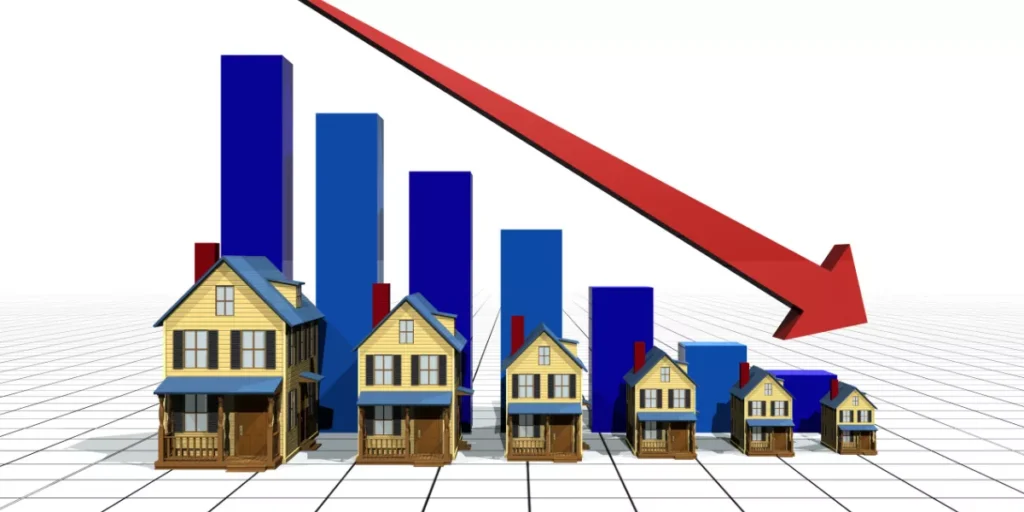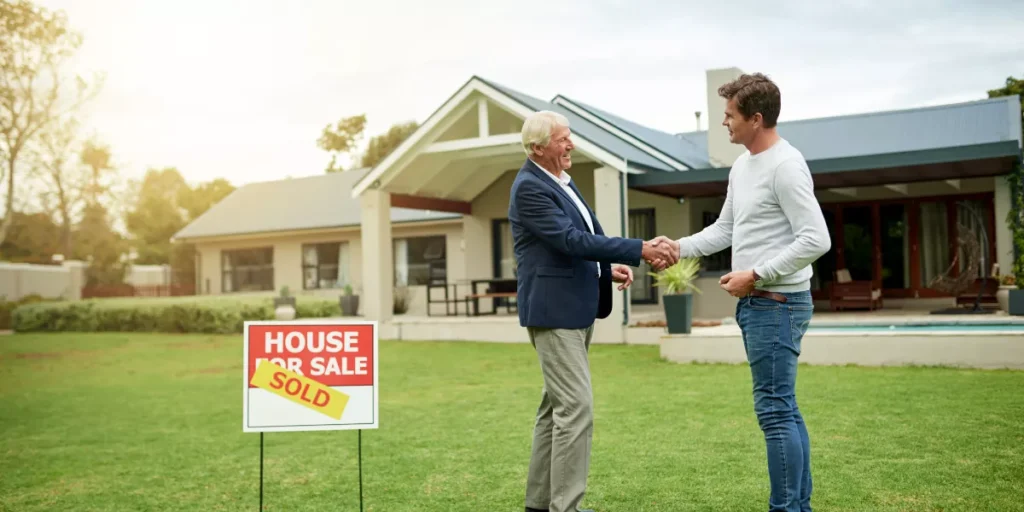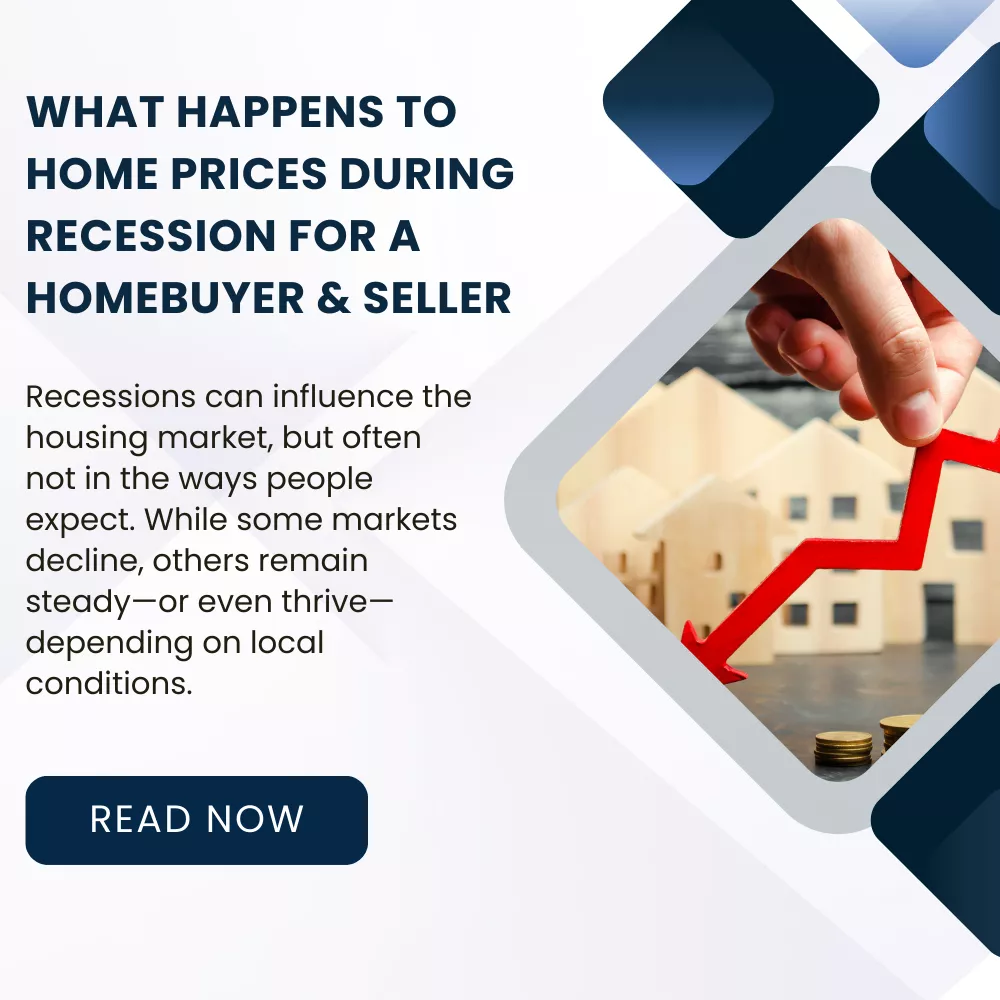Recession. Any homeowner or prospective buyer will sit up a little straighter just hearing the word. It’s normal to wonder what happens to home prices during a recession when the economy is struggling. Are they going to crash? Are they going to hold? Is it better to buy, sell, or wait?
The housing market can be affected by recessions, but not always in the ways that people anticipate. Depending on the local circumstances, some markets shrink, while others persist or flourish. It is necessary to look at the underlying economic factors that determine real estate as well as their contributions in order to understand what happens to home prices when the economy is in a recession.
What Is A Recession?

Although two consecutive quarters of negative GDP (Gross Domestic Product) are commonly used to define a recession, the term refers to more than just quantitative data. The economy is generally slowing down. Companies earn less money. The number of layoffs rises. Spending by consumers begins to decline, and all of a sudden, there is economic uncertainty.
However, not every recession could mean the same thing. Some are shallow and short. Others are lengthy and in-depth. For example, the 2008 financial crisis was a recession brought on by the collapse of the housing market. The decline of COVID-19? Motivated by a crisis in public health. They all have different effects on the housing market fluctuations.
Are We In A Recession Right Now?
It’s likely that more dinner tables are asking this question than ever before. Economic stress is indicated by a number of indicators, including slowing job growth, persistent inflation, and rising interest rates. But in a formal sense? We might not yet be officially in a recession.
Still, a lot of households are already struggling. The cost of mortgages has increased. The affordability of housing is stretched. Additionally, consumer confidence is erratic. People are becoming more cautious, whether or not we are officially in a recession, and that in and of itself has an impact on housing.
What Happens To Home Values In A Recession
Now to the heart of the matter: what happens to home prices during recession? The response is that it depends.
Home price growth slows down during many recessions, which impact the housing market. Prices sometimes decrease a little so it is cheaper to buy a home. However, prices rarely plummet all at once unless the recession is directly linked to a housing bubble, as was the case in 2008 housing crash.
Due to lower interest rates and an increase in remote work, home prices with better deals actually increased in many markets during the COVID-19 recession in 2020. In contrast, values fell dramatically in 2008 due to widespread mortgage defaults. Mortgage rates get high rather than mortgage rates dropping. Context is important.
In more “typical” recessions, we typically observe the following:
- Reduced demand as buyers grow wary or find it difficult to get loans.
- Fewer listings because homeowners might decide not to sell right away.
- Sluggish price increases or slight drops in hot markets.
In summary, the housing market typically cools down when the economy struggles, but it doesn’t always crash.
How Does A Recession Affect Home Value
Let’s break this down. A recession’s impact on home values is influenced by a number of factors:
1. Rates of Interest
In order to combat inflation, the Federal Reserve frequently raises interest rates, which results in higher mortgage rates and home prices. Demand declines along with purchasing power when monthly payments become more costly. Prices may be under pressure to decline as a result as mortgage rates often decline
2. Joblessness
People put off buying or moving when they are not financially stable. Because there is less competition when there are fewer buyers, rates fall, but not lower mortgage rates.
3. Inventory
Even if demand declines, prices may not fall much if there is low inventory. However, rates drop more precipitously if the market is overrun with distressed sales or foreclosures.
4. Regional Situations
Cities with weak economies or dwindling populations may not fare as well as markets like Austin and prices could increase during a recession, which have robust job growth and high demand.
The bottom line of it is that the majority of homeowners do not suffer a substantial loss in home equity unless they bought during the high point and sold during an economic downturn, although what affects home prices in a recession is a matter of location and timing.
Buying A House During A Recession

Is it wise to purchase a home in a recession? If you intend to keep the property for a long time and are financially secure and can take the blow of cut interest rates, it might be good to buy a home during a recession with the lower prices. Let’s examine the benefits and drawbacks:
Benefits
- Less Competition: Bidding wars are less likely to occur when there are fewer buyers in the market as home prices drop. When negotiating terms and price, that may give you the negotiating power in the trade war.
- Motivated Sellers: In this regard, some sellers may be in a rush to close deals, especially if they are constrained financially.
- Long-Term Value: If you buy shares when they drop, even a little, you can position yourself for long-term gains from equity after the market is over.
Drawbacks
- Higher Interest Rates: High interest rates could mean a higher monthly mortgage compared to low mortgage rates and can limit the amount of home you’ll be able to purchase.
- Job Insecurity: It may not be the opportune moment for you to take a huge financial responsibility of taking out a home loan and homebuying if you are not stable in your job.
- Price Fluctuations: The recovered value could take a while if the prices keep declining when you are planning to buy. A long-term perspective is therefore essential.
To put it briefly, purchasing during a recession is not about spotting a deal right away. It all comes down to finding a reliable property in a desirable area and having the money to weather any temporary setbacks when the time to buy a home comes. A realtor will come in perfectly helpful in navigating a volatile housing market
Conclusion
So, what happens to home prices during recession? There isn’t a single, universal solution. Certain markets cool. Some manage to remain surprisingly resilient. Buyer confidence, inventory levels, and local job markets are the most important factors.
There’s no need to freak out if you own your home. Minor declines in home value are a normal part of the economic cycle, unless you intend to sell immediately. And if you’re a purchaser? If you are well-financed with long-term goals in place, a recession could be a special opportunity for buying properties in a less competitive market.
One final piece of advice: having a reliable realtor is crucial whether you’re buying, selling, or just keeping an eye on things. That’s where we come in. As a top-rated Austin realtor with deep market knowledge and a commitment to helping clients thrive, no matter the market, we are the guide you need in uncertain times. Reach out to us today and get expert insights tailored to you.
FAQs
Q. Does A Recession Always Result In A Decline In Home Prices?
A: Not always. Although housing markets tend to cool during recessions, prices do not always decline. They may just stabilize or grow more slowly in some places. Local supply, demand, and economic factors determine everything in the real estate industry.
Q. Should I Sell My House In A Recession?
A: When selling during a recession to a homebuyer, selling well also depends on how your house was priced and how well it is sold. You may need to adjust your expectations with respect to time and cost, though. It is essential to work together with an experienced local agent.
Q. Should I Purchase A Home Now Or After A Recession?
A: Buying in lower home prices, especially if you are able to find bargains during a recession, is a smart move, if you are not broke. It could, however, be wiser to wait until the economy is better for your case if you have an uncertain status of employment and need the mortgage rates to drop.
Q. After A Recession, How Long Does It Take For Home Prices To Rise Again?
A: Timelines for recovery differ in the housing market during a recession. While some markets recover in a year or two, others might take longer to give you lower house prices. In the past, real estate has shown itself to be long-lasting.




